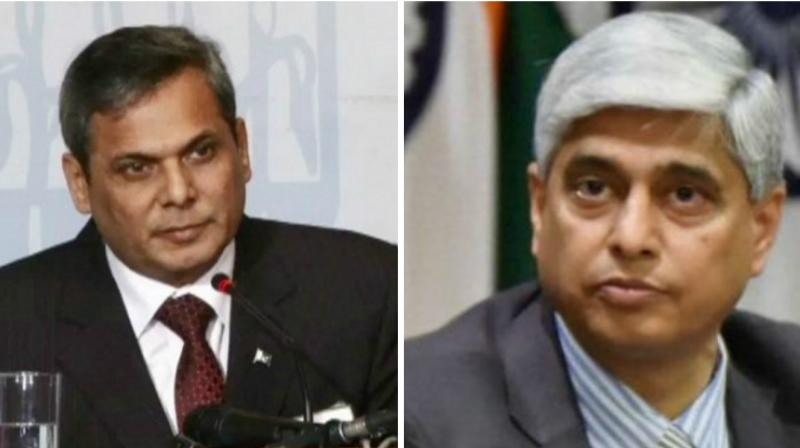Pakistan accuses 8 Indian diplomats of spying'; MEA rubbishes charge

Islamabad/New Delhi: Pakistan on Thursday named eight Indian High Commission officials alleging that they were members of Indian intelligence agencies and involved in "subversive activities", in the latest tit-for-tat action amid raging Indo-Pak tensions.
However India denied Pakistan’s charges and accused it of compromising the identities of the diplomats. “We completely reject allegations against Indian officials by Pakistan; these are crude attempts to target these officials,” said MEA spokesperson Vikas Swarup.
Pakistan’s Foreign Office Spokesman Nafees Zakaria had read out a statement at his weekly briefing saying that a number of Indian diplomats and staffers were involved in "coordinating terrorist and subversive activities in Pakistan under the garb of diplomatic assignments".
"Their names and designations are: Research and Analysis Wing's operatives -- RAW's station chief Anurag Singh, first secretary Commercial; Commercial Counsellor Rajesh Kumar Agnihotri; Amerdeep Singh Bhatti, attache visa; Dharmendra Sodhi, staff; Vijay Kumar Verma, staff; and Madhavan Nanda Kumar, staff," he said.
"Indian Intelligence Bureau's operatives are Balbir Singh, first secretary press and information and IB station chief and Jayabalan Senthil, assistant personnel welfare officer," Zakaria said.
He claimed that Surjeet Singh, who was declared persona non-grata by Pakistan a few days back, was also an IB operative. Surjeet was using a fake identity pretending to be telecom company Warid's employee, he claimed.
Pakistan had declared Surjeet persona non-grata after India's action against Pakistan High Commission official Mehmood Akhtar following Indian police's busting of an ISI-run spy ring.
"We are disappointed that India has not only been found involved in promoting terrorist activities and terror financing as was disclosed by Kulbhushan Jadhav and further confirmed by the statements at the highest political level on August 15 and earlier during (Prime Minister Narendra Modi's) visit to Dhaka, but India has also been using its diplomatic mission for its nefarious designs," he alleged.
Zakaria claimed that the High Commission officials were involved in "espionage, subversion and supporting terrorist activities in Balochistan and Sindh, especially Karachi, sabotaging China Pakistan Economic Corridor, and fuelling instability in the two provinces."
The officials also were damaging Pakistan-Afghanistan relations with a variety of activities, Zakaria alleged.
He claimed that the officials also handled factions of Tehreek-e-Taliban Pakistan (TTP), instigated religious minorities, fuelled sectarianism and maligned Pakistan with propaganda on human rights issues.
Zakaria also accused India of violating the diplomatic norms and code of conduct of maintaining relations between two sovereign states. He claimed that Indian security agencies knew that Akhtar was a High Commission official but they chose to violate the Vienna convention.
He alleged that India deliberately released the names of six other Pakistani diplomats falsely accusing them, which endangered their and their families' lives.
"Consequently, we had to recall them for their safety. These highly regrettable acts were also part of their desperation to divert world's attention from atrocities" in Kashmir, he claimed.

